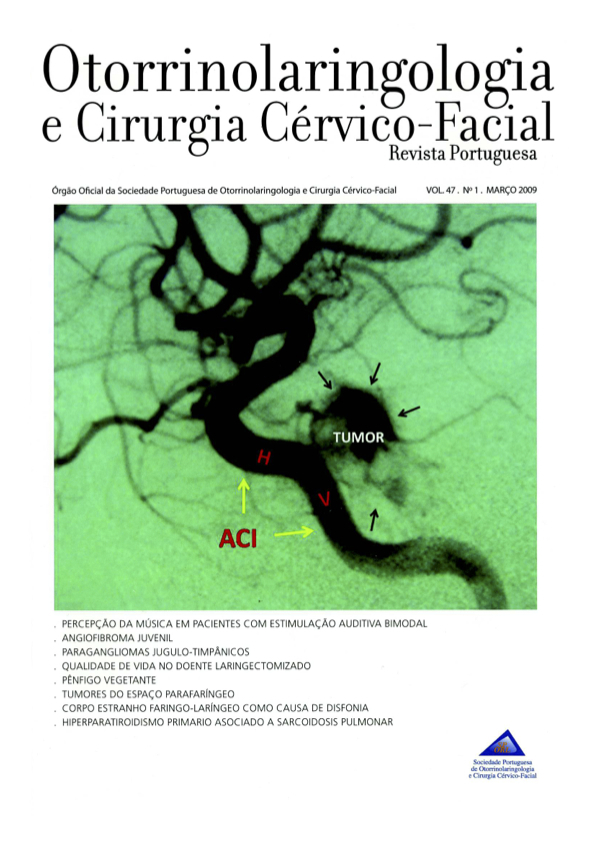Impacto da implantação coclear na avaliação subjetiva do acufeno
DOI:
https://doi.org/10.34631/sporl.2052Palavras-chave:
Adultos, THI, Implante coclear, AcufenoResumo
Objectivo: O acufeno é um sintoma frequente e incapacitante. Estima-se que tenha uma prevalência de 85% nos doentes candidatos a colocação de implante coclear (IC). Na surdez neurossensorial, o dano coclear envolvido é um fator desencadeante para o seu aparecimento. O principal objetivo deste trabalho foi determinar o impacto da colocação do implante coclear nas queixas de acufeno.Material e Métodos: Estudo prospetivo que incluiu 35 doentes com surdez neurossensorial severa/ profunda bilateral com queixas de acufeno bilateral, submetidos a colocação de IC unilateral entre janeiro e setembro de 2022. Todos os doentes responderam no pré-operatório e 3 meses após a colocação do IC ao Tinnitus Handicap Inventory (THI). Foi também definida a gravidade do acufeno.
Resultados: A média do resultado total no THI no pré-operatório foi de 40,2 ± 32,2 pontos. Aos 3 meses após a cirurgia verificou-se uma diminuição da média do resultado final (12,06±23,5) e em todas as suas subcategorias. A diferença na média no THI foi estatisticamente significativa entre o pré e o pós-operatório (p < 0,05); em 16 dos 35 doentes houve uma resolução completa do acufeno e apenas um teve um agravamento.
Conclusões: O nosso estudo mostrou uma melhoria do acufeno na maioria dos doentes submetidos a colocação de IC e uma resolução do mesmo em quase metade.
Downloads
Referências
Izuhara K, Wada K, Nakamura K, Tamai Y, Tsuji M, Ito Y. et al. Association between tinnitus and sleep disorders in the general Japanese population. Ann Otol Rhinol Laryngol. 2013 Nov;122(11):701-6. doi: 10.1177/000348941312201107.
Quaranta N, Wagstaff S, Baguley DM. Tinnitus and cochlear implantation. Int J Audiol. 2004 May;43(5):245-51. doi: 10.1080/14992020400050033.
Assouly KKS, van Heteren JAA, Stokroos RJ, Stegeman I, Smit AL. Cochlear implantation for patients with tinnitus – a systematic review. Prog Brain Res. 2021;260:27-50. doi: 10.1016/bs.pbr.2020.06.013.
Assouly KKS, Smit AL, Eikelboom RH, et al. Analysis of a cochlear implant database: changes in tinnitus prevalence and distress after cochlear implantation. Trends Hear. 2022 Jan-Dec;26:23312165221128431. doi: 10.1177/23312165221128431.
Yang J, Song J, Zhao X, Pang C, Cong N, Han Z. Restoration of deafferentation reduces tinnitus, anxiety, and depression: a retrospective study on cochlear implant patients. Neural Plast. 2021 Jun 24;2021:6678863. doi: 10.1155/2021/6678863.
Vallés-Varela H, Royo-López J, Carmen-Sampériz L, Sebastián-Cortés JM, Alfonso-Collado I. El implante coclear como tratamiento del acúfeno. Acta Otorrinolaringol Esp. 2013 Jul-Aug;64(4):253-7. doi: 10.1016/j.otorri.2012.11.008.
Mikkelsen KS, Ovesen T, Swan CZ. Pre-and post-operative dizziness, tinnitus, and taste disturbances among cochlear implant recipients. J Laryngol Otol. 2017 Apr;131(4):309-315. doi: 10.1017/S0022215116010008.
Assouly K, Smit AL, Stegeman I, Rhebergen KS, Van Dijk B, Stokroos R. Cochlear implantation for tinnitus in adults with bilateral hearing loss: protocol of a randomised controlled trial. BMJ Open. 2021 May 18;11(5):e043288. doi: 10.1136/bmjopen-2020-043288.
Hsieh WH, Huang WT, Lin HC. Investigation of the effect of cochlear implantation on tinnitus, and its associated factors. Acta Otolaryngol. 2020 Jun;140(6):497-500. doi: 10.1080/00016489.2020.1736338.
Ahmed MFM, Khater A. Tinnitus suppression after cochlear implantation in patients with single-sided deafness. Egypt J Otolaryngol. 2017;33(1):61-66. doi:10.4103/1012-5574.199404
Perreau A, Tyler R, Mancini PC. Programming a cochlear implant for tinnitus suppression. J Am Acad Audiol. 2020 Apr;31(4):302-308. doi: 10.3766/jaaa.18086.
Oliveira V, Meneses R. Balanço da utilização da versão portuguesa do Tinnitus Handicap Inventory (THI) [Internet]. Disponível em: https://recipp.ipp.pt/bitstream/10400.22/1922/4/PTE_VascoOliveira_2011.pdf
Ferreira PÉA, Cunha F, Onishi ET, Branco-Barreiro FCA, Ganança FF. Tinnitus handicap inventory: adaptação cultural para o Português brasileiro. Pró-Fono R. Atual. Cient. 2005;17(3):303-310. doi:10.1590/s0104-56872005000300004.
McCombe A, Baguley D, Coles R, McKenna L, McKinney C, Windle-Taylor P. Guidelines for the grading of tinnitus severity: the results of a working group commissioned by the British Association of Otolaryngologists, Head and Neck Surgeons, 1999. Clin Otolaryngol Allied Sci. 2001 Oct;26(5):388-93. doi: 10.1046/j.1365-2273.2001.00490.x.
Kloostra FJJ, Verbist J, Hofman R, Free RH, Arnold R, Van Dijk P. A prospective study of the effect of cochlear implantation on tinnitus. Audiol Neurootol. 2018;23(6):356-363. doi: 10.1159/000495132.
Poncet-Wallet C, Mamelle E, Godey B, Truy E, Guevara N, Ardoint M. et al. Prospective multicentric follow-up study of cochlear implantation in adults with single-sided deafness: tinnitus and audiological outcomes. Otol Neurotol. 2020 Apr;41(4):458-466. doi: 10.1097/MAO.0000000000002564.
Kompis M, Pelizzone M, Dillier N, Allum J, Demin N, Senn P. Tinnitus before and 6 months after cochlear implantation. Audiol Neurootol. 2012;17(3):161-8. doi: 10.1159/000335126.
Ramakers GGJ, Van Zon A, Stegeman I, Grolman W. The effect of cochlear implantation on tinnitus in patients with bilateral hearing loss: a systematic review. Laryngoscope. 2015 Nov;125(11):2584-92. doi: 10.1002/lary.25370.
Pan T, Tyler RS, Ji H, Coelho C, Gehringer AK, Gogel SA. Changes in the tinnitus handicap questionnaire after cochlear implantation. Am J Audiol. 2009 Dec;18(2):144-51. doi: 10.1044/1059-0889(2009/07-0042).
Kim DK, Bae SC, Park KH, Jun BC, Lee DH, Yeo SW. et al. Tinnitus in patients with profound hearing loss and the effect of cochlear implantation. Eur Arch Otorhinolaryngol. 2013 May;270(6):1803-8. doi: 10.1007/s00405-012-2193-2.
Olze H, Szczepek AJ, Haupt H, Förster U, Zirke N, Gräbel S. et al. Cochlear implantation has a positive influence on quality of life, tinnitus, and psychological comorbidity. Laryngoscope. 2011 Oct;121(10):2220-7. doi: 10.1002/lary.22145.
Downloads
Publicado
Como Citar
Edição
Secção
Licença
Direitos de Autor (c) 2023 Os autores mantêm os direitos de autor deste artigo.

Este trabalho encontra-se publicado com a Licença Internacional Creative Commons Atribuição-CompartilhaIgual 4.0.






